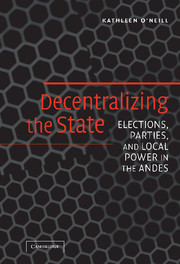7 - Comparisons, Conclusions, and Extensions
Published online by Cambridge University Press: 02 December 2009
Summary
The last several chapters have explored the relationship between decentralizing policies and the electoral concerns of political parties. Using multiple methods, a theory linking the two was developed and tested against alternative theories. Using statistical and case study analysis of Bolivia, Colombia, Ecuador, Peru, and Venezuela, strong support has been marshaled for the hypothesis that political parties in a position to shape the contours of center-subnational power-sharing arrangements are heavily influenced by their electoral prospects at different levels of government. This chapter briefly synthesizes the results from the statistical and case study analyses before taking advantage of a few focused, cross-country case comparisons to address some remaining questions. It ends with a brief sketch of some theoretical and empirical extensions.
This volume opened with a formal model, which added precision to the general theory that electoral concerns affect decentralizing decisions; the model allowed me to check the exact relations between key factors. This led to the testable hypotheses that decentralization becomes more attractive to parties who perceive greater electoral opportunities at the local level than at the national level based on their constellation of electoral support. The formal model also singled out the importance of stable support over time in parties' decision calculus. Parties discount future time periods heavily when the volatility of their past support makes predicting future support difficult. Because the benefits of decentralization accrue in the future, higher discount rates on future periods greatly depress the incentives of parties to reform in this way.
- Type
- Chapter
- Information
- Decentralizing the StateElections, Parties, and Local Power in the Andes, pp. 207 - 242Publisher: Cambridge University PressPrint publication year: 2005



